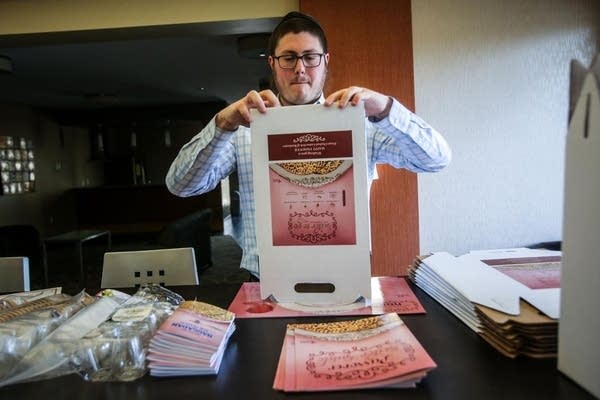Stay-at-home Seder: Minnesotans find Passover meaning in a pandemic

Go Deeper.
Create an account or log in to save stories.
Like this?
Thanks for liking this story! We have added it to a list of your favorite stories.
Seder tables across Minnesota will likely be a little bit smaller this year, as families mark the beginning of Passover in the midst of a global pandemic.
James Cohen and his daughter spent about three hours one night this week putting together what they're calling a "COVID-19 Haggadah,” the Jewish text that sets out the order of the Seder.
They plan to share it online with family members in Minnesota and other states who they won’t see this year, because of the coronavirus pandemic.
"We specifically put lemons on the cover of our new creation, because we're going to make lemonade out of this Haggadah,” Cohen said with a laugh. “I think that we're all doing our best."
Turn Up Your Support
MPR News helps you turn down the noise and build shared understanding. Turn up your support for this public resource and keep trusted journalism accessible to all.
Share your Seder with MPR News. We’d love to see photos or hear an audio recording from your Minnesota Seder table tonight, especially if you’re finding creative ways to celebrate. Send to reporter Kirsti Marohn at kmarohn@mpr.org.
The virus outbreak has created a challenge for faith communities as they try to stay connected and maintain religious traditions while congregations remain apart.
In Minnesota, a stay-at-home order is keeping people mostly confined to their houses. A large gathering of relatives, friends and community members isn't a safe option in a time of social distancing.
"It makes it a lot different, there's no question about it,” said Cohen, who is CEO of the Minneapolis Jewish Federation. “There are many people whose favorite Jewish moment of the year is the Seder.” That’s in part, he said, “because everyone is around the same table.”
This year, Jewish families, synagogues and other organizations are finding new ways to connect and find meaning in the rituals of Passover, Cohen said.

"People are just having to make the best of it,” he said. “I'm so proud of so many people in the community who are determined not to lose touch with the people they care about.”
Passover, which begins at sundown on Wednesday, is an eight-day festival that commemorates the emancipation of the Israelites from slavery. Jews mark the beginning of Passover with the Seder meal, a gathering layered with symbolism and ritual that involves eating traditional foods and retelling the story of the Jews’ exodus out of Egypt.
At Adath Jeshurun Congregation in Minnetonka, members are using video technology like Zoom to host virtual Seders with relatives and friends, said Rabbi Aaron Weininger. But Weininger said he knows separation on a cherished holiday can still be painful.
"None of that replicates the face-to-face,” he said. “We do recognize that grief is there, and it runs deep."
For some, the prospect of preparing a Seder meal in their own home for the first time might seem daunting. Synagogues and Jewish organizations are offering do-it-yourself Seder tips and videos online, giving people a chance to gather supplies — and practice the songs and readings ahead of time.
In Rochester, Chabad of Southern Minnesota is distributing "Seder to Go" kits that include the key elements of the celebration, including a Seder plate, unleavened bread or matzo, bitter herbs and the Haggadah, the traditional book of passages to be read during the meal.

Rabbi Shloime Greene said in past years, his Chabad hosted a community Seder with close to 100 people. That's not an option this year, so he figures families might need a little help flying solo.
"Like, if you always go to your friend's house for Thanksgiving dinner, and now you've got to do [it] yourself,” Greene said. “All of a sudden, you're calling your friend and saying, ‘How do you make the turkey? Where do you buy the turkey?’"
The last thing Greene tucks into each kit is a little toy frog — a nod to one of the plagues of Egypt, and part of the Exodus story. It’s also intended to put a smile on people's faces during a difficult time, he said.
Greene said he knows that a holiday celebrating freedom might seem odd while people are stuck in their houses. But freedom can have different meanings, and this year's Passover takes on special significance, he said.
"The idea of freedom doesn't mean that now I am free to do as I wish,” Greene said. “True freedom is having the discipline to make the right choices. And it’s not about necessarily what I want. It’s about what God wants.”
Greene said right now, the right choice is to celebrate Passover with close family at home — or online — to protect the health of the community, even if it’s difficult.
COVID-19 in Minnesota
Health officials for weeks have been increasingly raising the alarm over the spread of the novel coronavirus in the United States. The disease is transmitted through respiratory droplets, coughs and sneezes, similar to the way the flu can spread.
Government and medical leaders are urging people to wash their hands frequently and well, refrain from touching their faces, cover their coughs, disinfect surfaces and avoid large crowds, all in an effort to curb the virus’ rapid spread.
The state of Minnesota has temporarily closed schools, while administrators work to determine next steps, and is requiring a temporary closure of all in-person dining at restaurants, bars and coffee shops, as well as theaters, gyms, yoga studios and other spaces in which people congregate in close proximity.


